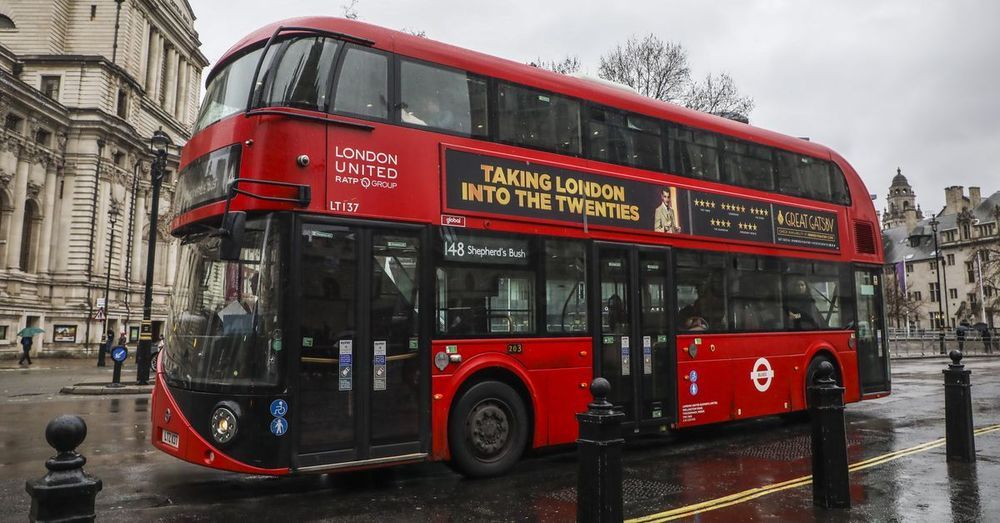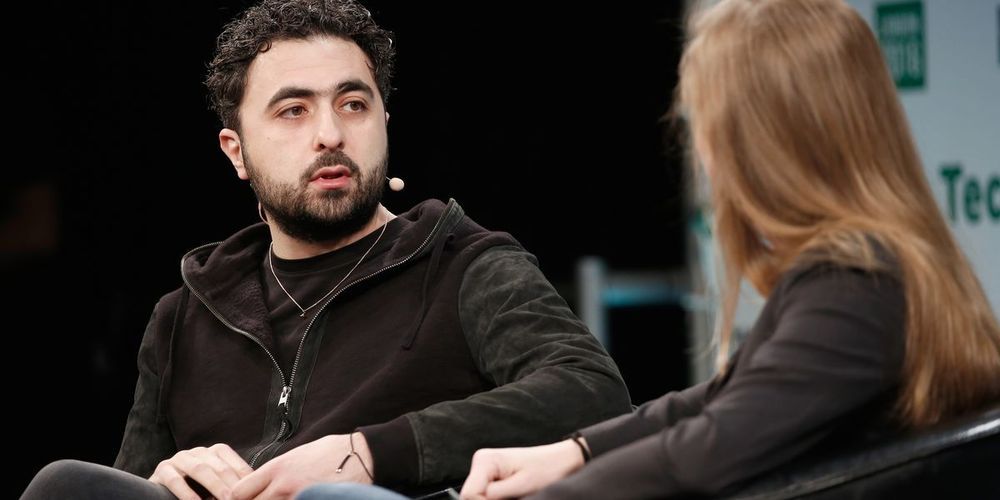A Silicon Valley lobby enrolled elite academia to avoid legal restrictions on artificial intelligence.



From next year, some of London’s electric buses will play artificial noise while traveling at low speeds, and the specific sound that’s been created for them is an ambient treat for the ears. The noise was created by Zelig Sound, which has been working with Transport for London on the audio over the past year.
The sound is being introduced in response to a new EU law which stipulates that all electric vehicles will eventually need to produce artificial noise while traveling at low speeds, to make up for the lack of noise from their internal engines. If you can’t hear a vehicle, then you’re not as aware of its presence, and research suggests pedestrians are more likely to be hit by electric or hybrid cars as a result.
Wired reports the base note is a soft F#maj7 chord, with a slight pulsing sound in the background. This is what gets played when a bus is stationary:
More: https://www.burzynskimovie.com/
About the director: https://ericmerola.com
A 2016 updated version of this story: http://estore.burzynskimovie.com/
More info http://www.burzynskimovie.com
Directed by Eric Merola
http://www.ericmerola.com
Learn more about the director: http://merolaproductions.com/eric-merola-bio
Burzynski, the Movie is an internationally award-winning documentary originally released in 2010 (with an Extended Edition released in 2011) that tells the true story of a medical doctor and Ph.D biochemist named Dr. Stanislaw Burzynski who won the largest, and possibly the most convoluted and intriguing legal battle against the Food & Drug Administration in American history.
His victorious battles with the United States government were centered around Dr. Burzynski’s gene-targeted cancer medicines he discovered in the 1970’s called Antineoplastons, which have currently completed Phase II FDA-supervised clinical trials in 2009 and has been given permission by the FDA to begin the final phase of FDA testing–randomized controlled clinical trials.

The personnel changes at Alphabet continue, this time with Mustafa Suleyman — one of the three co-founders of the company’s influential AI lab DeepMind — moving to Google.
Suleyman announced the news on Twitter, saying that after a “wonderful decade” at DeepMind, he would be joining Google to work with the company’s head of AI Jeff Dean and its chief legal officer Kent Walker. The exact details of Suleyman’s new role are unclear but a representative for the company told The Verge it would involve work on AI policy.
The move is notable, though, as it was reported earlier this year that Suleyman had been placed on leave from DeepMind. (DeepMind disputed these reports, saying it was a mutual decision intended to give Suleyman “time out … after 10 hectic years.”) Some speculated that Suleyman’s move was the fallout of reported tensions between DeepMind and Google, as the former struggled to commercialize its technology.

[Editor’s Note: Mad Science Laboratory is pleased to excerpt below the Executive Summary from a DoD Biotechnologies for Health and Human Performance Council (BHPC) study group report entitled, Cyborg Soldier 2050: Human/Machine Fusion and the Implications for the Future of the DOD. This report, authored by Peter Emanuel, Scott Walper, Diane DiEuliis, Natalie Klein, James B. Petro, and James Giordano (proclaimed Mad Scientist); and published by the U.S. Army Combat Capabilities Development Command Chemical Biological Center (CCDC CBC), culminates a year-long assessment to forecast and evaluate the military implications of machines that are physically integrated with the human body to augment and enhance human performance over the next 30 years. This report summarizes this assessment and findings; identifies four potential military-use cases for new technologies in this area; and makes seven recommendations on how the U.S. should proceed regarding human/machine enhancement technologies. Enjoy!]

A DoD BHPC study group surveyed a wide range of current and emerging technologies relevant to assisting and augmenting human performance in many domains. The team used this information to develop a series of vignettes as case studies for discussion and analysis including feasibility; military application; and ethical, legal, and social implication (ELSI) considerations.
Ultimately, the team selected four vignettes as being technically feasible by 2050 or earlier. The following vignettes are relevant to military needs and offer capabilities beyond current military systems:

Lawyers and doctors are typically paid more than manual laborers because of the relative shorter supply of lawyers and doctors, which is in part due to the number of years of training required to enter those professions and the corresponding value society attributes to those skills. But what will happen to their wages once the market is faced with an abundance of skilled labor? If anyone is able to upload legal or medical know-how to their brain and know just as much as the professionals in those fields, why pay a professional a higher wage?
Of course, certain skills, such as strategic judgment and contextual understanding, may be difficult, if not impossible, to digitize. But even the games of chess and Go, both complex games that require strategic decision-making and foresight, have now been conquered by AIs that taught themselves how to play—and beat—some of the best human players.
The technology’s potential for emancipation and human advancement is immense. But we—entrepreneurs, researchers, professionals, policymakers, and industry—must not lose sight of the social risks.
TABLE OF CONTENTS —————
0:00–17:57 : Introduction (Meaning of Life)
17:58–37:45 CHAPTER 1: Longevism and Life Extension
—————————————————————————————–
WHY DOES AGING HAPPEN?
—————————————————————————————–
37:46–54:39 CHAPTER 2 : Gerontonology and Aging a. Free Radical Theory of Aging b. Waste Accumulation Theory of Aging c. Stem Cell Theory of Aging d. DNA Damage Theory of Aging.
—————————————————————————————–
HOW DO WE CURE AGING?
—————————————————————————————–
54:39–1:08:39 : CHAPTER 3 :The Biochemical Solution (#1)
a. mitoSENS
b. oncoSENS
c. lysoSENS
d. amyloSENS
e. apoptoSENS
f. repliSENS
g. glycoSENS
1:08:40–2:13:12 CHAPTER 4 : The Physiological Solution (#2)
a. Parabiosis and Biovampirism b. Regeneration and Stem Cells c. Lab Grown Organs and Bioprinting d. Head Transplants and Doppleganger Bodies.
2:13:12–2:33:19 CHAPTER 5 : The Genetic Solution (#3)
a. TALEN genetic engineering b. Zinc-Finger gene tailoring c. CRISPR-Cas9 gene editing.
—————————————————————————————–
WILL WE CURE AGING GENETICALLY?
—————————————————————————————–
2:33:20–2:49:58 : CHAPTER 6 : Genomics and DNA
2:49:59–3:05:48 : CHAPTER 7 : Transcriptomics and RNA
3:05:49–3:22:08 : CHAPTER 8 : Proteomics and TNA
3:22:09–3:39:38 : CHAPTER 9 : Xenobiology and XNA
a. alien proteins b. alien base pairs c. alien DNA
3:39:39–3:54:58 : CHAPTER 10 : Vectors and Gene Therapy (Gene Editing #1)
3:54:59–4:14:57 : CHAPTER 11 : Synthetic Biology (Gene Editing #2)
4:14:58–4:32:14 : CHAPTER 12 : Chimeras, Rianths, and Splices (Gene Editing #3)
4:32:15–4:48:35 : CHAPTER 13 : Ouroborology and Immortal Chimeras (Gene Editing #4)
4:48:36-:5:03:52 : CHAPTER 14 : Kleptoplasty and Photosynthesis (Gene Editing #5)
—————————————————————————————-
HOW TO SURVIVE UNTIL AGING IS CURED
—————————————————————————————-
5:03:53–5:14:27 : CHAPTER 15 : Survive to the Singularity a. the breakeven point b. longevity escape velocity c. the longevity dividend.
5:14:28–5:30:16 : CHAPTER 16 : Centennarians and Blue Zones (Survival Method #0)
a. loma linda b. ikaria c. sardinia d. okinawa.
5:30:17–5:42:26 : CHAPTER 17 : Risk Aversion and Micromorts (Survival Method #1)
a. micromorts
b.microlives
5:42:27–5:58:18 : CHAPTER 18 : Nutraceuticals and Geroprotectors (Survival Method #2)
a. rapamycin b. metformin c. selegilene d. nicotinamide riboside e. resverratrol.
5:58:19–6:12:51 : CHAPTER 19 : Caloric Restriction (Survival Method #3)
a. endocrine b. epigenetic c. genetic
6:12:52–6:51:57 : CHAPTER 20 : Cryonics & Cryogenics (Survival Method #4)
a. the efficacy question b. the cost question c. the resurrection question d. the identity question e. the legal question f. the catastrophe question g. the culture question.
—————————————————————————————–
CAN WE BE IMMORTAL WITHOUT CURING AGING?
—————————————————————————————–
_______________________________________________________
6:51:58–7:04:08 : CHAPTER 21 : Genetic Immortality — Test Tube Babies
7:04:09–7:24:02 : CHAPTER 22 : Genetic Immortality — Designer Babies
7:24:03–7:41:55 : CHAPTER 23 : Genetic Immortality — Clone Babies
7:41:56–7:53:08 : CHAPTER 24 : Genetic Immortality — Artificial Wombs
7:53:08–7:53:09 CHAPTER 25 : Immortalism and Ethics a. the crime argument b. the natural argument c. the boredom argument d. the inequality argument e. the overpopulation argument f. the gerontocracy argument g. the economic argument h. EPILOGUE
Patreon https://www.patreon.com/transhumania
KEYWORDS :
Immortology, Athanophy, Biotechnology, Biotech, Bioviva, Alcor, Calico, Nanotechnology, Nanotech, Reverse Aging, Live Forever, Caloric Restriction, Blue Zone, Centenarian, Singularity, Nutraceuticals, Geroprotectors, Metformin, Seligiline, Rapamycin, Nikolai Fedorov, Aubrey De Grey, Immortalism, Peter Thiel, Gerontology, Telomere, Elizabeth Blackburn, Free Radicals, Oxidative Stress, SENS, Bioinformatic, Transcriptomics, Proteonomics, Genomics, CRISPR Cas9, Synthetic Biology, Craig Venter, Retrovirus, Gene Therapy, Gene Editing, Xenobiology, Epigenetics, RNAi interference, C2C2, David Sinclair, Resveratrol, Sirtuin, Gene, Kleptoplasty, Splice, Spidergoat, Rianth, Chimera, IVF, Test Tube Designer Baby, Cloning South Korea, Artificial Womb, Ectogenesis, Human Cloning, Panyotis Zavos, Stem Cell, Parabiosis, 3D Bioprinting, Regenerative Medicine, Thomas Rando, Sergio Canavero, Head Transplant, Biostasis, Cryopreservation, Cryonics, Vitrification, Extropianism.
“Unplugged Performance thoroughly reworks the suspension with a custom race valved adjustable coilover suspension kit, along with billet adjustable front upper control arms, billet adjustable rear camber and toe arms and a beefier 3 way adjustable front/rear sway bar set with uprated bushings. The highly adjustable suspension and handling capabilities pair with massive 6 piston 15.5” uprated brakes and competition brake pads. Unplugged Performance 20” wheels shod with Michelin Cup 2 tires are then fitted. The wheels are custom machined out of 6061-T6 billet APP forgings, the same forgings used by Koenigsegg and Lamborghini, and every set is FEA optimized and specifically engineered to the specific build’s desired spec and use. Wheel weights range from 19.6–21.0lbs in 20” with tire sizings up to 305mm wide.”
While Tesla is working on a track-focused Model S, the Model 3 Performance is getting its own street-legal racing treatment from Unplugged Performance.
We previously reported on Unplugged Performance (UP), which is one of a few aftermarket accessories and performance upgrade companies focused solely on Tesla vehicles.
They are also the company behind ‘Tesla Corsa’, a new Tesla-only race track experience where owners get to safely explore the limits and performance of their vehicles.

It’s been called an online Iron Curtain.
On Friday, a controversial law went into force that enables Russia to try to disconnect its internet from the rest of the world, worrying critics who fear the measure will promote online censorship.
The Kremlin says its “sovereign internet” law, which was signed by President Vladimir Putin in May, is a security measure to protect Russia in the event of an emergency or foreign threat like a cyberattack. The law will allow Moscow to tighten control over the country’s internet by routing web traffic through state-controlled infrastructure and creating a national system of domain names.
